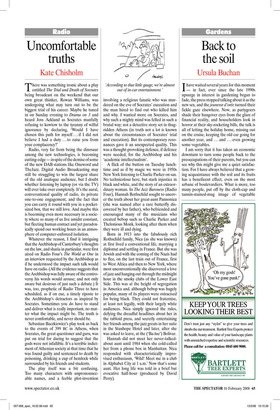Uncomfortable truths
Kate Chisholm
There was something ironic about a play entitled The Trial and Death of Socrates being broadcast on the weekend that our own great thinker, Rowan Williams, was undergoing what may turn out to be the biggest trial of his career. Maybe he tuned in on Sunday evening to Drama on 3 and heard Joss Ackland as Socrates manfully refusing to kowtow to the tyranny of wilful ignorance by declaring, ‘Would I have chosen this path for myself... if I did not believe I had a duty... to raise you from your complacency?’ Radio, very far from being the dinosaur among the new technologies, is becoming cutting-edge — in spite of the demise of some of the new DAB stations like Oneword and TheJazz. Digital Audio Broadcasting may still be struggling to win the largest share of the old analogue audience, but I doubt whether listening by laptop (or via the TV) will ever take over completely. It’s the aural, conversational quality of radio, its private one-to-one engagement, and the fact that you can carry it round with you in a pocketsized box, that we still love. And maybe this is becoming even more necessary in a society where so many of us live amidst constant, but fleeting human contact and yet paradoxically spend our working hours in an atmosphere of computer-enforced isolation.
Whatever the reason, I find it intriguing that the Archbishop of Canterbury’s thoughts on the law, and sharia in particular, were first aired on Radio Four’s The World at One in an interview requested by the Archbishop as if he understood the impact such talk would have on radio. (All the evidence suggests that the Archbishop was fully aware of the controversy his words would arouse; and not only aware but desirous of just such a debate.) It was, too, prophetic of Radio Three to have scheduled, as if on cue, a timely riposte to the Archbishop’s detractors as inspired by Socrates. Sometimes you do have to stand and deliver what is really important, no matter what the impact might be. The truth is never comfortable, and never should be.
Sebastian Baczkiewicz’s play took us back to the events of 399 BC in Athens, when Socrates, the great questioner and guru, was put on trial for daring to suggest that the gods were not infallible. It’s a terrible indictment of Athenian society at that time that he was found guilty and sentenced to death by poisoning, drinking a cup of hemlock while surrounded by his friends and students.
The play itself was a bit confusing. Too many characters with unpronounceable names, and a feeble plot-invention involving a religious fanatic who was murdered on the eve of Socrates’ execution and the man hired to find out who killed him and why. I wanted more on Socrates, and why such a mighty mind was felled in such a brutal way; not a detective story set in thugridden Athens (in truth not a lot is known about the circumstances of Socrates’ trial and execution). But its contemporary resonances gave it an unexpected quality. This was a thought-provoking defence, if defence were needed, for the Archbishop and his ‘academic intellectualism’.
A flick of the button on Tuesday lunchtime and as if by magic we were in 1950s New York listening to Charlie Parker on sax. No technicolour here, but stark injustice in black and white, and the story of an extraordinary woman. In The Jazz Baroness (Radio Four), Hannah Rothschild sought to uncover the truth about her great-aunt Pannonica (she was named after a rare butterfly discovered by her father), who befriended and encouraged many of the musicians who created bebop such as Charlie Parker and Thelonious Monk, looking after them when they were ill and dying.
Born in 1913 into the fabulously rich Rothschild family, Nica (as she was known) at first lived a conventional life, marrying a diplomat and settling in France. But she was Jewish and with the coming of the Nazis had to flee, on the last train out of France, first to West Africa and then to New York, where most unconventionally she discovered a love of jazz and hanging out through the midnight hour in the smoky clubs of the Lower East Side. This was at the height of segregation in America and, although bebop was hugely popular, many of its players were ostracised for being black. They could not fraternise, at least not legally, with their largely white audiences. Nica simply ignored the rules, defying the dreadful headlines about her in the tabloid press, and secretly entertaining her friends among the jazz greats in her suite in the Stanhope Hotel and later, after she was asked to leave, at the (‘Ba-lue’) Bolivar.
Hannah did not meet her never-talkedabout aunt until 1984 when she cold-called her from a phone box in Manhattan. Nica responded with characteristically improvised enthusiasm, ‘Wild! Meet me in a club in Alphabet City at 1 a.m.’ Now that’s some aunt. Her long life was told in a brief but evocative half-hour (produced by David Perry).


















































































 Previous page
Previous page